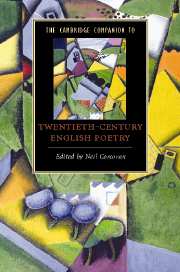1 - Victorian to modern
from Part I - Contexts
Published online by Cambridge University Press: 28 January 2008
Summary
In 1886 William Butler Yeats was introduced to Gerard Manley Hopkins in Dublin. Both were to play a significant part in the history of English verse, yet they constitute an ill-matched pair. Hopkins was a Jesuit priest but also an English patriot who felt painfully out of place in Catholic Ireland, whereas the young Yeats was far from orthodox in his religious beliefs, although descended from a Church of Ireland clergyman. When confronted with Hopkins he seems to have experienced a reaction which was predictably Irish and recognisably Protestant: his impression was the usual Irish one that Hopkins was 'a detested aesthete' and that he had brought a 'faint theatrical Catholicism to Ireland'; the Irish, Yeats told Humphry House, apropos of Hopkins, had 'no sympathy with English Aesthetic Catholicism'. Many years later, Yeats wrote about Hopkins as someone 'whom I knew', vacillated about which poems should be included in The Oxford Book of Modern Verse and mis-remembered, or misrepresented, the occasion: 'a boy of seventeen, with Walt Whitman in his pocket, had little interest in a querulous, sensitive scholar.'
Yeats may have had a copy of Whitman in his pocket, a detail intended to suggest a wide gulf of taste, but the example of the American poet seems to have left little trace on his own verse. On the other hand, Hopkins once said that, even if he had only read 'half a dozen pieces at most', 'I always knew in my heart Walt Whitman's mind to be more like my own than any other man's living.' This suggests an undeclared and significant affinity with the poet recognised by D. H. Lawrence in Studies in Classic American Literature (1923) as 'greatest of the Americans'.
- Type
- Chapter
- Information
- Publisher: Cambridge University PressPrint publication year: 2007

